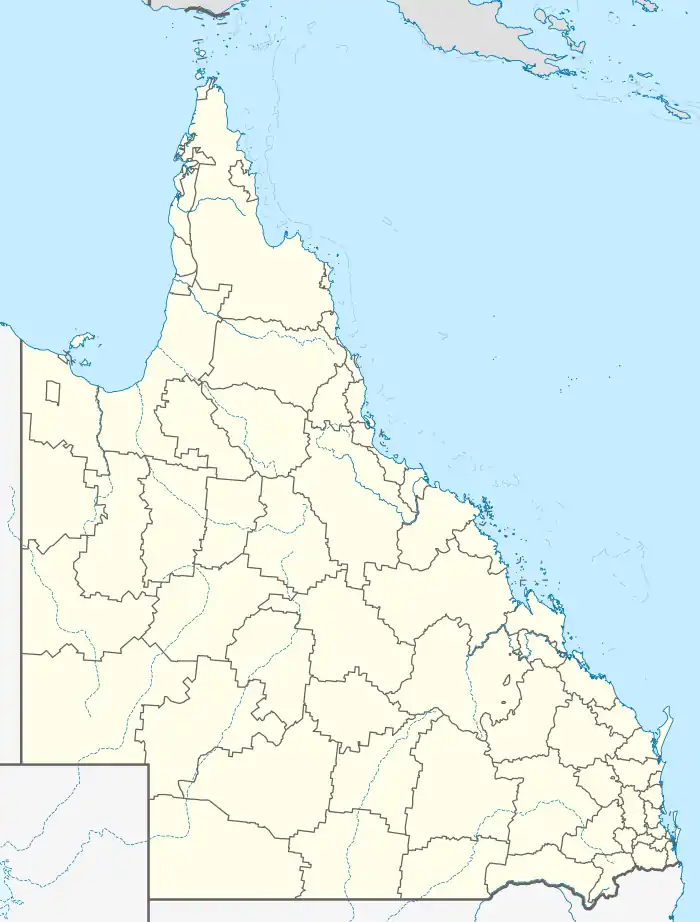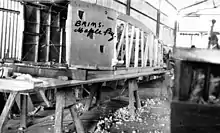Cloncurry Airport | |||||||||||||||
|---|---|---|---|---|---|---|---|---|---|---|---|---|---|---|---|
| Summary | |||||||||||||||
| Airport type | Public | ||||||||||||||
| Operator | Cloncurry Shire Council | ||||||||||||||
| Location | Cloncurry, Queensland | ||||||||||||||
| Elevation AMSL | 616 ft / 188 m | ||||||||||||||
| Coordinates | 20°39′55″S 140°30′23″E / 20.66528°S 140.50639°E | ||||||||||||||
| Map | |||||||||||||||
 YCCY Location in Queensland | |||||||||||||||
| Runways | |||||||||||||||
| |||||||||||||||
Cloncurry Airport (IATA: CNJ, ICAO: YCCY) is an airport in Cloncurry, Queensland, Australia.
History

Cloncurry Airport has been the focal point for many of Australia's greatest innovations. Cloncurry was involved with the beginnings of QANTAS, and the original QANTAS hangar is still in use at the aerodrome, where "Queensland and Northern Territory Aerial Service" is still displayed above the hangar door.
The Royal Flying Doctor Service was founded there in 1928, now recognised the world over. The airport was also on route for early planes coming from overseas and a stopping place for contestants in the great air races of 1919 and 1934.
In the late 1930s (as early as 1938, as late as 1941), the KNILM service from Batavia (Jakarta) to Sydney, connecting at Batavia from Amsterdam on KLM, called at Cloncurry. On the way South, passengers spent the night, while on the way North, they had a luncheon in Cloncurry.[2]
In early 2022, Horizon Airways established a base in Cloncurry providing flight training for all initial and advanced training, as well as fixed wing charter flight services.
World War II
Due to the strategic importance of Cloncurry aerodrome on the main Darwin–Sydney air route, the Royal Australian Air Force expanded the aerodrome during World War II. Intended to be a major airbase should the Empire of Japan have occupied New Guinea and Papua.
During the Second World War, Cloncurry Airport was the site of a major United States Army Air Forces air base in 1942. As the war moved north, the USAAF units located north to forward bases.
List of wartime military units based at Cloncurry Aerodrome
- No. 29 Operational Base Unit RAAF - 22 June 1942 – 5 July 1943
- No. 30 Operational Base Unit RAAF - 12 December 1942 – 19 September 1946
- No. 107 Radar Station RAAF - 1 June 1942 – 11 September 1942
- No. 108 Radar Station RAAF - 1 June 1942 – 11 September 1942
- USAAF 19th Bombardment Group B-17 Flying Fortress
- HQ 19th Bomb Group assigned to Essendon Airport, Melbourne, Victoria
- 28th Bombardment Squadron, (28 March-5 May 1942)
- Detachment operated from: Perth Airport, Perth, Western Australia, (28 March-18 May 1942)
- 30th Bombardment Squadron, (24 March-13 May 1942)
- 93d Bombardment Squadron, (29 March-18 May 1942)
Airlines and destinations

| Airlines | Destinations |
|---|---|
| Alliance Airlines | Brisbane, Townsville Mining charter: Cairns |
| QantasLink | Mount Isa, Townsville |
See also
References
- ↑ YCCY – Cloncurry (PDF). AIP En Route Supplement from Airservices Australia, effective 2023-11-30, Aeronautical Chart Archived 25 March 2012 at the Wayback Machine
- ↑ "KNILM Timetable". airline timetable images. Retrieved 31 December 2021.
![]() This article incorporates public domain material from the Air Force Historical Research Agency
This article incorporates public domain material from the Air Force Historical Research Agency
- Pacific Wrecks database
- RAAF Museum website
- Maurer, Maurer (1983). Air Force Combat Units of World War II. Maxwell AFB, Alabama: Office of Air Force History. ISBN 0-89201-092-4.
- Maurer, Maurer, ed. (1982) [1969]. Combat Squadrons of the Air Force, World War II (PDF) (reprint ed.). Washington, DC: Office of Air Force History. ISBN 0-405-12194-6. LCCN 70605402. OCLC 72556.